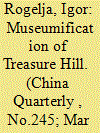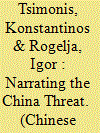|
|
|
Sort Order |
|
|
|
Items / Page
|
|
|
|
|
|
|
| Srl | Item |
| 1 |
ID:
178893


|
|
|
|
|
| Summary/Abstract |
This article discusses the “museumification” of an urban village in Taipei into the Treasure Hill Artist Village in the context of wider debates on gentrification and the redevelopment of marginal urban spaces. Populated by soldiers evacuated to Taiwan following the Chinese Civil War, Treasure Hill became a hybrid space, combining welfare provision for elderly veterans with an artist colony, forming part of the Taipei Cultural Foundation. Lauded as a compromise that combined social, cultural and economic aspects of urban regeneration, the mix of high-modernist paternalism and neoliberal place-making resulted in the integration of the space into the existing city bureaucracy as a museum-like institution, with elderly residents and artists becoming exhibits in a living diorama. Although widely understood as “gentrification” at the time, the article argues that the museumification of Treasure Hill was a process led by a coalition of state and spatial experts which has distinct implications for the study of state-led neighbourhood amelioration.
|
|
|
|
|
|
|
|
|
|
|
|
|
|
|
|
| 2 |
ID:
175841


|
|
|
|
|
| Summary/Abstract |
This article unpacks the discursive construction of a European ‘China Threat’ narrative by European think tanks. We theorise think tanks as crucial actors in the securitising process, especially at the initial stages where ideas and reference frames are formed. Despite having no decision-making authority, think tanks participate as securitising actors in the process of idea formation and bidding, articulating a securitised frame of reference for policy makers. In the case of EU–China relations, we observe an emerging congruence between think tanks and policy makers that engage in a non-linear construction of a ‘China Threat’ policy frame. In this article, we review key think tank reports that are circulated through official EU policy channels and deconstruct the assumptions behind the ‘China Threat’ discourse. We first argue that, analytically, their securitising attempt is characterised by a distorted representation of Chinese economic activities abroad, including those falling under the Belt and Road Initiative. Second, politically, this narrative produces a distorted notion of European politics where pluralism is weakness and disagreement dissent, promoting a view of the EU where ‘responsible’ core countries must contain the periphery’s ‘opportunism’. Third, we contend that despite defending ‘Europeanness’ as the epitome of human rights and democracy, the securitisation of Chinese FDI rests on othering practices that risk undermining those very ideals. By identifying the problematic undertones of this securitising effort, we call for a fact-based and pluralistic debate on the challenges of Chinese investment and financing for European economies and societies.
|
|
|
|
|
|
|
|
|
|
|
|
|
|
|
|
|
|
|
|
|